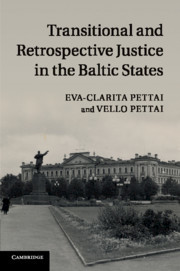Description
Transitional and Retrospective Justice in the Baltic States
Authors: Pettai Eva-Clarita, Pettai Vello
An empirically rich and conceptually informed study of the politics of transitional justice in post-communist Estonia, Latvia and Lithuania.
Language: English
Subject for Transitional and Retrospective Justice in the Baltic States:
Approximative price 38.06 €
In Print (Delivery period: 14 days).
Add to cart
Transitional and Retrospective Justice in the Baltic States
Publication date: 12-2018
Support: Print on demand
Publication date: 12-2018
Support: Print on demand
Approximative price 117.70 €
In Print (Delivery period: 14 days).
Add to cart
Transitional and Retrospective Justice in the Baltic States
Publication date: 12-2014
390 p. · 16x23.6 cm · Hardback
Publication date: 12-2014
390 p. · 16x23.6 cm · Hardback
Description
/li>Contents
/li>Biography
/li>
More than twenty years after the fall of communism, many countries in Central and Eastern Europe are still seeking truth and justice for the repression suffered under communist rule. This search has been particularly notable in the Baltic states, given the three countries' histories as both former Soviet republics and later member-states of the European Union. On the one hand, the legacy of Stalinist oppression was more severe in these countries than elsewhere in Central Europe, but on the other hand much of this past could more easily be externalized onto the former Soviet Union (and by extension Russia) following re-independence. Transitional and Retrospective Justice in the Baltic States develops a novel conceptual framework in order to understand the politics involved with transitional and retrospective justice, and then applies this outline to the Baltic states to analyze more systematic patterns of truth- and justice-seeking in the post-communist world.
Introduction; 1. Post-communist transitional justice: framing the subject; 2. Comparable or incomparable: placing the Baltic states in context; 3. Punishing the perpetrators: criminal investigations and trials; 4. Truth or punishment: purges, bargains and exposure of wrongdoing; 5. Righting past wrong: rehabilitation, compensation and restitution for victims; 6. Official recognition of victims: non-judicial truth-seeking and commemoration; 7. External reverberations: the international dimension of Baltic truth and justice; Conclusions.
Eva-Clarita Pettai is Senior Researcher at the Institute of Government and Politics, University of Tartu, Estonia.
Vello Pettai is Professor of Comparative Politics and Director of the Institute of Government and Politics, University of Tartu, Estonia.
Vello Pettai is Professor of Comparative Politics and Director of the Institute of Government and Politics, University of Tartu, Estonia.
© 2024 LAVOISIER S.A.S.




